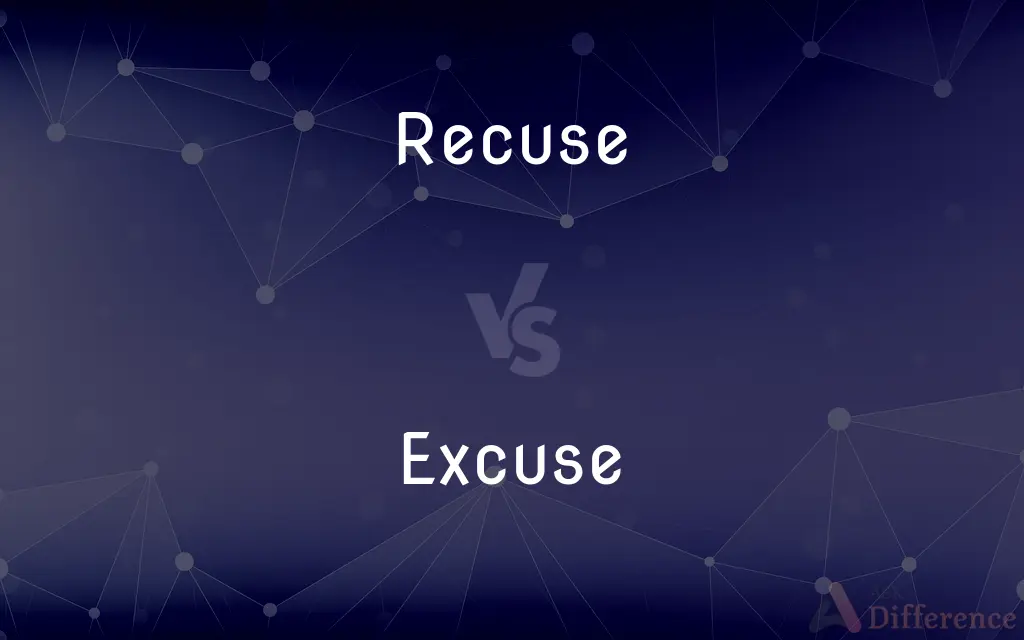Recuse vs. Excuse — What's the Difference?
By Fiza Rafique & Urooj Arif — Updated on April 15, 2024
Recuse involves a judge or official withdrawing from a case due to potential bias or conflict of interest, whereas excuse pertains to justifying or obtaining release from an obligation or fault.

Difference Between Recuse and Excuse
Table of Contents
ADVERTISEMENT
Key Differences
Recuse is a formal legal term that refers to the act of a judge or other official disqualifying themselves from a case because of a potential conflict of interest or bias. On the other hand, excuse is used more broadly in everyday language to refer to the act of justifying a fault or releasing someone from an obligation.
In the legal context, recusing is mandatory if there is any appearance of bias that could affect the fairness of proceedings, whereas an excuse can be subjective and vary depending on the circumstances or societal norms.
Recusal is often accompanied by a formal procedure, including stating the reason for withdrawal and sometimes finding a replacement. Conversely, making an excuse does not typically involve a formal process and is more informal.
The consequences of not recusing oneself when required can lead to appeals and retrials in legal scenarios. In contrast, failing to adequately excuse oneself might lead to social or minor professional repercussions, but rarely legal ones.
Recuse and excuse both involve perceptions of integrity and responsibility, but recuse is specifically aimed at maintaining fairness in judicial and official matters, while excuse often relates to personal accountability or minor obligations.
ADVERTISEMENT
Comparison Chart
Definition
Withdraw from duties due to bias
Justify or seek release from fault
Context
Primarily legal
Legal, social, personal
Formality
Highly formal with procedures
Informal, often verbal
Consequences
Legal repercussions, retrials
Social, professional repercussions
Requirement
Mandatory in case of conflict
Not mandatory, often optional
Compare with Definitions
Recuse
To withdraw from a judicial case due to potential bias or conflict of interest.
The judge had to recuse himself from the trial because he knew the defendant personally.
Excuse
A reason or explanation offered to justify a fault.
He used the traffic as an excuse for his tardiness.
Recuse
Legal obligation to step aside in certain circumstances.
Ethics require officials to recuse themselves when conflicts arise.
Excuse
To release someone from duty or obligation.
She was excused from jury duty due to her medical condition.
Recuse
To disqualify oneself from a decision-making process.
She recused herself from the voting due to a financial interest in the matter.
Excuse
Justifying absence or failure.
He needed a valid excuse to miss the meeting.
Recuse
Judicial withdrawal to avoid conflict of interest.
To maintain fairness, he decided to recuse himself.
Excuse
To seek exemption from a penalty.
They excused his absence with a doctor's note.
Recuse
Official self-disqualification.
The committee member recused herself from the discussion.
Excuse
To pardon or forgive an offense.
She excused his mistake, understanding it was not intentional.
Recuse
To disqualify or seek to disqualify (a judge or juror) from participation in the decision in a case, as for personal prejudice against a party or for personal interest in the outcome.
Excuse
In jurisprudence, an excuse is a defense to criminal charges that is distinct from an exculpation. Justification and excuse are different defenses in a criminal case (See Justification and excuse).
Recuse
To reject or repudiate (an authority, a person, a court judgment, etc.).
Excuse
To make allowance for; overlook or forgive
Please excuse the interruption.
Recuse
(obsolete)
Excuse
To grant pardon to; forgive
We quickly excused the latecomer.
Recuse
Of a judge, juror, or prosecutor: to declare oneself disqualified from trying a court case due to an actual or potential conflict of interest or lack of impartiality.
The district attorney recused from the case because he used to work for the company which was the defendant.
Excuse
To apologize for (oneself) for an act that could cause offense
She excused herself for being late.
Recuse
To refuse or reject, as a judge; to challenge that the judge shall not try the cause.
Excuse
To explain (a fault or offense) in the hope of being forgiven or understood; try to justify
He arrived late and excused his tardiness by blaming it on the traffic.
Recuse
To withdraw oneself from serving as a judge or other decision-maker in order to avoid a real or apparent conflict of interest; - often used with the reflexive; as, the judge recused himself due to a financial interest in the matter.
Excuse
To serve as justification for
Witty talk does not excuse bad manners.
Recuse
Disqualify oneself (as a judge, for example) in a particular case
Excuse
To free, as from an obligation or duty; exempt
She was excused from jury duty because she knew the plaintiff.
Recuse
Challenge or except to a judge as being incompetent or interested, in canon and civil law
Excuse
To give permission to leave; release
The child ate quickly and asked to be excused.
Excuse
An explanation offered to justify or obtain forgiveness.
Excuse
A reason or grounds for excusing
Ignorance is no excuse for breaking the law.
Excuse
The act of excusing.
Excuse
A note explaining an absence.
Excuse
(Informal) An inferior example
A poor excuse for a poet.
A sorry excuse for a car.
Excuse
(transitive) To forgive; to pardon.
I excused him his transgressions.
Excuse
(transitive) To allow to leave, or release from any obligation.
May I be excused from the table?
I excused myself from the proceedings to think over what I'd heard.
Excuse
(transitive) To provide an excuse for; to explain, with the aim of alleviating guilt or negative judgement.
You know he shouldn't have done it, so don't try to excuse his behavior!
Excuse
To relieve of an imputation by apology or defense; to make apology for as not seriously evil; to ask pardon or indulgence for.
Excuse
Explanation designed to avoid or alleviate guilt or negative judgment; a plea offered in extenuation of a fault.
Tell me why you were late – and I don't want to hear any excuses!
Excuse
(legal) A defense to a criminal or civil charge wherein the accused party admits to doing acts for which legal consequences would normally be appropriate, but asserts that special circumstances relieve that party of culpability for having done those acts.
Excuse
An example of something that is substandard or of inferior quality.
That thing is a poor excuse for a gingerbread man. Hasn't anyone taught you how to bake?
He's a sorry excuse for a doctor.
Excuse
To free from accusation, or the imputation of fault or blame; to clear from guilt; to release from a charge; to justify by extenuating a fault; to exculpate; to absolve; to acquit.
A man's persuasion that a thing is duty, will not excuse him from guilt in practicing it, if really and indeed it be against Gog's law.
Excuse
To pardon, as a fault; to forgive entirely, or to admit to be little censurable, and to overlook; as, we excuse irregular conduct, when extraordinary circumstances appear to justify it.
I must excuse what can not be amended.
Excuse
To regard with indulgence; to view leniently or to overlook; to pardon.
And in our own (excuse some courtly stains.)No whiter page than Addison remains.
Excuse
To free from an impending obligation or duty; hence, to disengage; to dispense with; to release by favor; also, to remit by favor; not to exact; as, to excuse a forfeiture.
I pray thee have me excused.
Excuse
To relieve of an imputation by apology or defense; to make apology for as not seriously evil; to ask pardon or indulgence for.
Think ye that we excuse ourselves to you?
Excuse
The act of excusing, apologizing, exculpating, pardoning, releasing, and the like; acquittal; release; absolution; justification; extenuation.
Pleading so wisely in excuse of it.
Excuse
That which is offered as a reason for being excused; a plea offered in extenuation of a fault or irregular deportment; apology; as, an excuse for neglect of duty; excuses for delay of payment.
Hence with denial vain and coy excuse.
Excuse
That which excuses; that which extenuates or justifies a fault.
If eyes were made for seeing.Then beauty is its own excuse for being.
Excuse
A defense of some offensive behavior or some failure to keep a promise etc.;
He kept finding excuses to stay
Every day he had a new alibi for not getting a job
His transparent self-justification was unacceptable
Excuse
A note explaining an absence;
He had to get his mother to write an excuse for him
Excuse
A poor example;
It was an apology for a meal
A poor excuse for an automobile
Excuse
Accept an excuse for;
Please excuse my dirty hands
Excuse
Grant exemption or release to;
Please excuse me from this class
Excuse
Serve as a reason or cause or justification of;
Your need to sleep late does not excuse your late arrival at work
Her recent divorce amy explain her reluctance to date again
Excuse
Defend, explain, clear away, or make excuses for by reasoning;
Rationalize the child's seemingly crazy behavior
He rationalized his lack of success
Excuse
Ask for permission to be released from an engagement
Excuse
Excuse, overlook, or make allowances for; be lenient with;
Excuse someone's behavior
She condoned her husband's occasional infidelities
Common Curiosities
What does it mean to recuse oneself in court?
To recuse oneself in court means that a judge or participating legal official voluntarily steps down from hearing a case due to a real or perceived conflict of interest or bias, to maintain the fairness and integrity of the legal proceedings.
What are common reasons for a judge to recuse themselves?
Common reasons include personal relationships with any parties involved, financial interests in the outcome, previous involvement in the case or related cases, or personal beliefs that could affect impartial judgment.
How is an excuse different from a lie?
An excuse is a justification for an action or mistake, intended to lessen blame without necessarily deceiving. A lie, however, is a false statement made with the intent to deceive others. While excuses can be truthful or deceitful, lies are inherently dishonest.
Is recusal always mandatory in legal settings?
Yes, recusal is mandatory whenever there is a potential conflict of interest or bias that could compromise the fairness and impartiality of legal proceedings.
How does culture impact what is considered a valid excuse?
Cultural norms and values can significantly influence what is considered a valid excuse, as expectations for behavior and responsibility can vary widely between different societies.
Can a judge excuse himself instead of recusing?
In legal terms, a judge cannot simply "excuse" himself from a case; the correct term is "recuse." Recusal is a formal process intended to prevent any bias in judicial proceedings, whereas excusing generally refers to justifying or avoiding blame in casual contexts.
What is a good example of a personal excuse?
A common personal excuse might be explaining one's lateness to an appointment by citing heavy traffic. This provides a reason for the delay without necessarily shifting blame.
What are the consequences of inappropriate excuses in professional environments?
Inappropriate excuses can lead to a loss of trust, professional credibility, and potentially disciplinary action, depending on the severity and context of the excuse.
Can excuses be legally binding?
Generally, excuses are not legally binding. They are explanations or justifications that do not hold legal weight, unlike formal pardons or dismissals in a legal context.
How do professionals handle recusal in non-judicial contexts?
In non-judicial contexts, professionals might step back from decision-making processes if they have a conflict of interest, similar to judicial recusal, to maintain ethical standards and transparency.
Can excuses affect the outcome of legal proceedings?
While excuses themselves do not typically affect the outcome of legal proceedings, the reasons behind them, such as mitigating circumstances, can influence judgments in certain cases.
What makes an excuse acceptable?
An acceptable excuse generally provides a legitimate, understandable, and proportionate reason for failing to meet an obligation or expectation, without intending to deceive.
What are typical excuses in professional settings?
Typical excuses might include missing a deadline due to unforeseen circumstances, such as technical failures or health issues, provided these reasons are communicated appropriately and timely.
How to handle situations requiring recusal?
Handling situations requiring recusal involves acknowledging the conflict, informing those affected, and stepping away from the decision-making process to ensure fairness and integrity.
What are ethical implications of not recusing?
Not recusing when required can lead to questions about the fairness and integrity of decisions, potentially resulting in legal challenges and damage to professional credibility.
Share Your Discovery

Previous Comparison
Quantify vs. Qualify
Next Comparison
Cave vs. CavernAuthor Spotlight
Written by
Fiza RafiqueFiza Rafique is a skilled content writer at AskDifference.com, where she meticulously refines and enhances written pieces. Drawing from her vast editorial expertise, Fiza ensures clarity, accuracy, and precision in every article. Passionate about language, she continually seeks to elevate the quality of content for readers worldwide.
Co-written by
Urooj ArifUrooj is a skilled content writer at Ask Difference, known for her exceptional ability to simplify complex topics into engaging and informative content. With a passion for research and a flair for clear, concise writing, she consistently delivers articles that resonate with our diverse audience.
















































